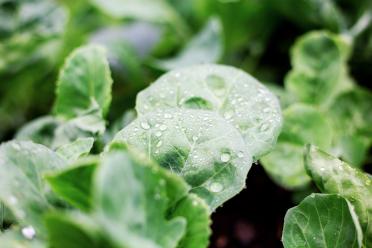
Their ambition is to halve the time it takes for new vegetable varieties to reach producers.
The £260,000 project is being supported by Innovate UK, the UK’s national innovation agency, through its Knowledge Transfer Partnership awards.
It will enable cutting-edge research to be applied in an industrial setting, supporting the implementation of new marker-assisted and genomic-based selection methods for desirable traits in celery and other vegetables commercialised by Tozer.
The Earlham Institute has been developing and pioneering the use of new technologies to overcome issues of scale and complexity in data-intensive bioscience, including approaches that could be used to accelerate crop breeding.
There is an urgent need to develop improved, more resilient crops, both to cope with increasing global demand and to introduce resilience to climate change and plant pathogens.
There are many desirable traits breeders want to introduce to make improvements to their lines. But finding the right genetic ‘recipe’ is incredibly complex due to the interrelated nature of the genes that govern them and the laborious methods traditionally used in breeding programmes.
This project will help Tozer’s breeders identify new biodiversity associated with a wide range of desirable traits they want to get into their future lines. The goal is to see new and improved vegetable varieties, including celery, reaching producers in half the time as current approaches.
The group has developed and benchmarked new computational “imputation” pipelines to generate markers for large populations from very low-density information. They implemented end-to-end pipelines that use linear mixed models for genomic-based predictions and finding links between markers and traits.
The project will also look to identify the genes behind certain desirable traits, which will accelerate the efficiency of celery breeding programmes at Tozer.
Dr Jose de Vega, project lead and Group Leader at the Earlham Institute, said: “Knowledge Transfer Partnership awards help to bridge the gap between academia and industry. Our project will help breeders to take the approaches we’ve developed and benchmarked in some major crops and adopt these in crops that are new to us but important for UK food security.
“The scheme is designed to reduce some of the risks for the company and provide support for the partnership so these new approaches are integrated into the business in the long run. To do that effectively, we’ll be working with Tozer so they can adapt and acquire the necessary skills to scale these approaches.
“Our ability to apply these cutting-edge genomic technologies in industrial applications is something we must continue if we’re going to address a range of urgent global challenges.”
The partnership will use much of the Earlham Institute’s existing expertise, pipelines, and software tools to assess a range of phenotypes and genotypes, from which they can identify the right genetic markers for these traits. Those new markers will allow these beneficial traits to be brought into the breeding process.
It will also benefit from the bioinformatics expertise within the Institute, making use of many of the innovations developed in-house for genomic predictions and marker identification.
Tozer is a vegetable plant breeding company based in the UK, producing seed varieties that are sold around the world.
Dr Jamie Claxton, Director of R&D at Tozer Seeds, said: “This is a really exciting opportunity for us to access the superb genomics expertise at the Earlham Institute.
“The KTP Associate will embed this knowledge within an innovative commercial business so that successful new varieties that respond to fast evolving challenges such as climate change and disease can be more quickly developed than traditional techniques currently used, potentially saving us years of work.
“The KTP associate will gain very broad experience, having an inter-departmental approach and learning all aspects of the business at Tozer Seeds, including visiting field trials both overseas and the UK, giving a commercial application to fully complement the genomics expertise they will gain from the Earlham Institute.”
